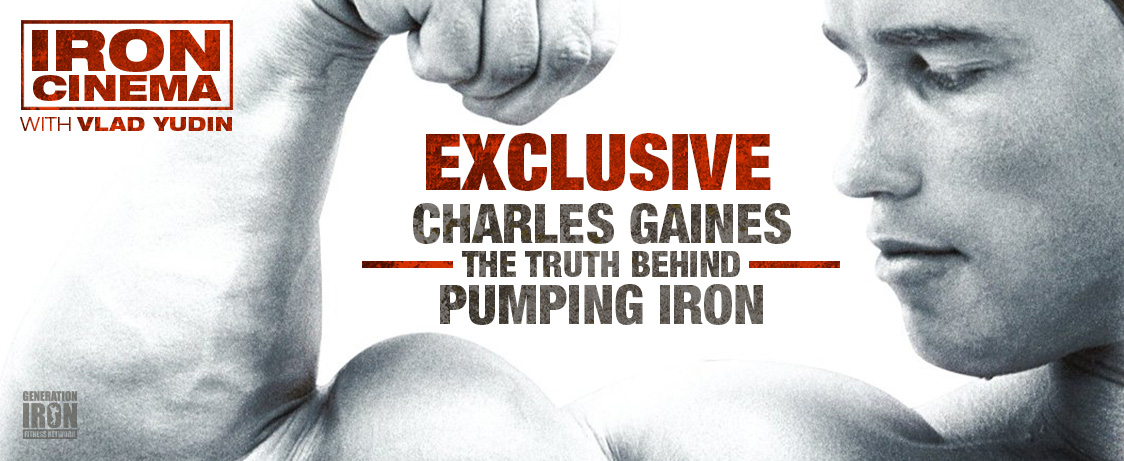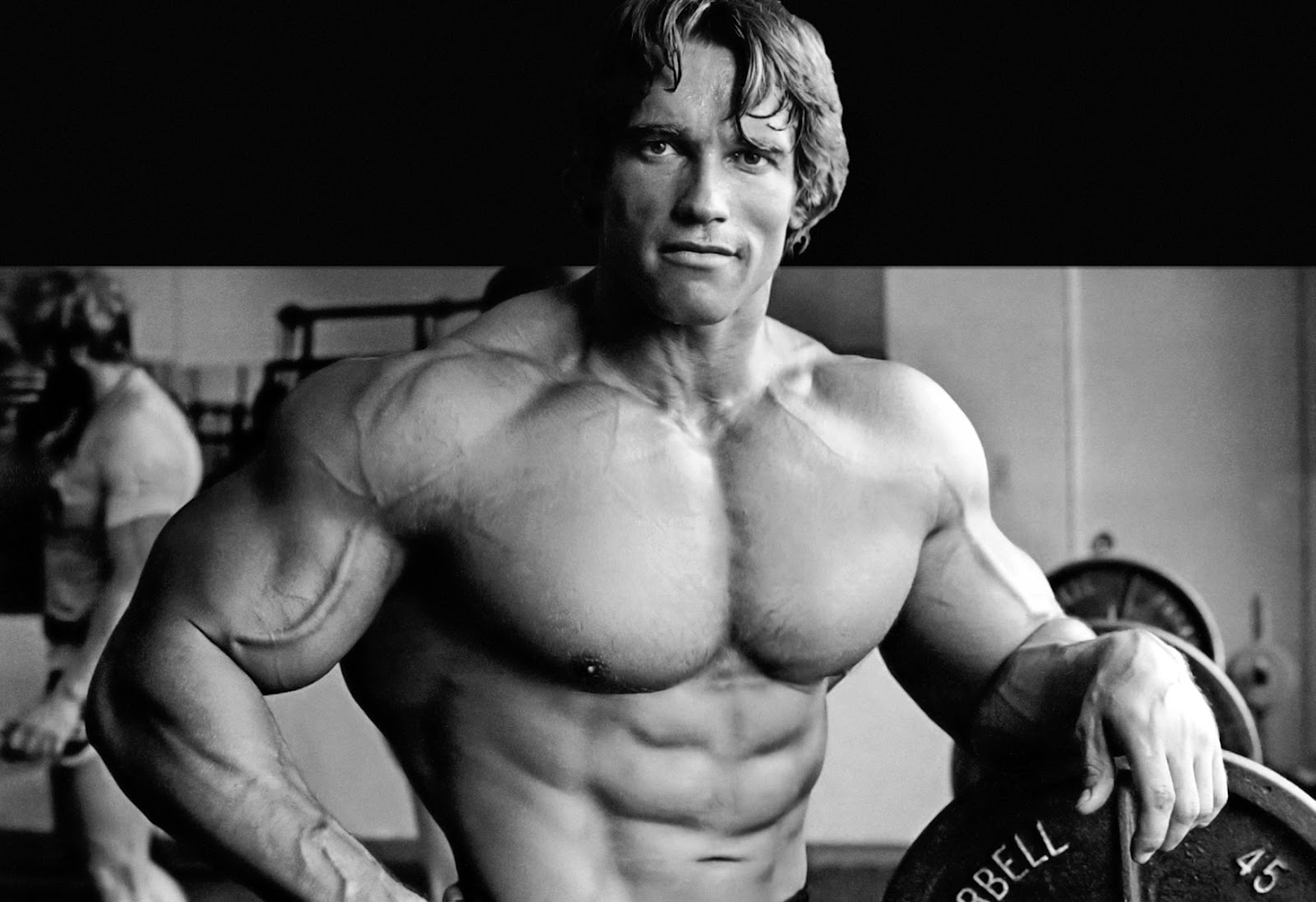The Genesis of Bodybuilding’s Rise.
Every week, Iron Cinema will connect you with Generation Iron director Vlad Yudin. Giving you unprecedented inside access to the creative process behind his the Generation Iron Fitness Network. Get a first hand look at the entire journey of taking Vlad’s creative ideas to the big screen – from stories on set of films like Generation Iron and CT Fletcher all the way to exclusive behind-the-scene looks at our newest GI news and films. This week Vlad lands an exclusive interview with Charles Gaines – who not only helped write and narrate the film Pumping Iron – but wrote the book that came before it of the same name.
VLAD YUDIN: I’m actually holding in my hand right now the book Pumping Iron which you’re the author of and I just wanted to know: How did you get an the idea to write this book? What was the inception of Pumping Iron?
CHARLES GAINS: Well, I had been a bodybuilder myself in my teens and thought it was an interesting subject that nobody had written about. My first novel was a book called Stay Hungry, and it was made into a movie directed by Bob Rafelson. It was the first movie that Arnold Schwarzenegger was ever in, other than a thing called Hercules in New York which had a very limited release.
So I was the one who talked Bob into using Arnold. Rafelson was a very fine Hollywood director who directed Five Easy Pieces, King of Marvin Gardens, Easy Rider and lots of very good films… he didn’t think that a bodybuilder could act and I kept telling him about Arnold. Arnold was not at all well known at this point in the USA and George Butler and I had done our first magazine article ever written about him in WE Magazine. We also did another one in Sports Illustrated – so when my book Stay Hungry was bought for the movies, Bob Rafelson and I thought Arnold had to play the main role – a guy named Joe Santos who is a bodybuilder in the book.
He finally decided to meet Arnold and was immediately captivated by him. So he hired him to play that role. Jeff Bridges and Sally Field were also in the movie and it did very well. Arnold ended up winning a Golden Globe and while we were making it – George Butler came in to visit during the course of the film. We had already written the book Pumping Iron and we had got the inspiration for writing it through my relationship with Arnold.
.
V: Let’s rewind a bit. Before the movie, how did the book Pumping Iron come together?
So bodybuilding was not at all very well known and when I went to see my editor at Doubleday, who published Stay Hungry, about doing the book that George and I wanted to do (Pumping Iron) – he said, “Well that’s ridiculous, nobody’s going to buy a book about a bunch of homosexuals.” It was an absurd idea and he was not going to do it. So we had all given up on it.
Later I was down in Key West and I ran into a friend of mine who was a young New York agent. This guy said I think it’s a great idea, I’ll represent it for you. My agent had given up on it and so had George’s. So we went back to New York and this young agent, Bob Dattila, got us to the point with Simon and Schuster… and a man named Dan Green who was then the head editor at Simon and Schuster. Dan just happened to understand the book and what we were after and said “yeah let’s do it” and when George and I explained to him it was going to require a lot of travel on our part – much of which was in exotic places like Lebanon, Baghdad, and Iraq and so forth – that we needed a pretty big advance and he said, “Name me your advance. I’ll write it out.”
So that’s how the book happened and of course from doing the book we came to know Arnold even better and that we had a world class personality on our hands. The book deserved a movie version… so George, Myself, and a man named Jerome Gary, who was the producer of Pumping Iron, got together and decided that we would try to make the film and we went out and raised the money privately.
V: Was it a difficult process converting this book into a film?
CG: No, not really. The competition is built into bodybuilding. Whenever you’ve got competition, you’ve got a frame for either a book or a documentary. And we had Arnold, who was at that point the king, and we had this young contender in Louie Ferrigno, who was much bigger than Arnold and a lot of people thought he could beat him. It’s also arguable that if Ferrigno had better coaching than his father; a better diet; and knew more what he was doing – he might’ve beaten Arnold. He was certainly bigger and more muscular and outweighed by about 20 lbs – he just didn’t know what he needed to get in the kind of thin-ish shape that Arnold, Franco, Frank Zane and a few other pros knew how to do.
So he really never stood a chance with Arnold for as long as he competed against him. But no, it was not particularly difficult; we had all these great characters… It was not difficult when you had a personality that’s big as Arnold who can carry a whole movie on his own.
.
V: Now since you mentioned it, there was a lot of talk after the film about scenes and interviews that were fictionalized to create drama. For example, Arnold said certain things that were actually made up. Is some of that true? Is most of it made up? How did you go about creating the scenes?
CG: Well it’s a feature documentary which means traditionally in a documentary you create scenes to allow the truth to happen. I mean, that’s just the classic definition of a great feature documentary. You stage certain scenes in order to allow it to happen in a dramatic way, [something] that might or could happen anyway – so to my understanding you don’t have the license to just make things up out of old cloth and create characters that don’t really exist. You don’t make up events and stage things that couldn’t possibly happen in the context of what you’re documenting.
For example, when Mike Katz losses his t-shirt, that was staged, I mean we had the T-shirt disappear but in the context of the relationship between Mike and Ken Waller that could very well happen, but it just happened to be us that thought of it. And we wanted something to pre-occupy Mike and to allow him to express some of that very touching, moving, hang-dog parts of his personality. We also wanted to show Ken Waller as the semi-bully that he was in real life. It was a staged scene but it was a scene that was the truth of the situation of characters.
.
V: What about the scene where Arnold said he didn’t go to his father’s funeral, was that something he said or was it staged?
CG: Well as far as I know that’s true. He told me long before, in fact that was in the book Pumping Iron. Long before we made the movie he freely admitted that he was training and that he didn’t go to his father’s funeral. Right or wrong, he had it pegged as an act and made it seem that it was pegged just for the film – that somebody told him to say it. But in fact I believe, I mean I wasn’t around for his father’s funeral, but I believe that’s a true story.
.
Head on over to page 2 to hear Charles talk about how much the bodybuilding landscape immediately changed after Pumping Iron and the surprising contribution he has made to paintball… yes, that paintball. Click NEXT PAGE to read on!
[wptouch target=”mobile”]
[/wptouch][wptouch target=”non-mobile”][/wptouch]










